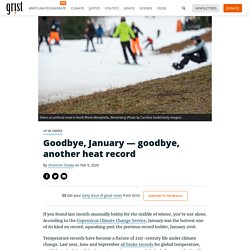

Podcast. Rencontre en humanité au Salon de l'agriculture. Vagues de chaleur et changement climatique 28/02/2020. So should we just plant a bunch of trees everywhere, or what? Q.

Dear Umbra, Would it help the planet for us to buy property and plant native trees? –Just One Half-Noble Notion for You A. Mangrove forests protect coastlines. ‘Synthetic mangroves’ could do the same for cities. Humans have lots of reasons to thank mangroves.

These swampy, stilt-rooted trees store massive amounts of carbon on tropical shorelines, support nurseries for a wide variety of commercially important fish species, and protect coastal areas from storm damage. Besides these benefits for people, mangroves are unique among trees because they thrive in shallow seawater that’s too salty for most living beings to grow in. To better understand exactly how mangroves can grow in the ocean yet pump freshwater up to their leaves, engineers constructed what they’re dubbing “synthetic mangroves”, pressure-driven devices that can draw freshwater out of the saltiest seas — and have the potential to help manage stormwater in cities. Quilters and knitters are mapping climate change. This story was originally published by Slate and is reproduced here as part of the Climate Desk collaboration.

Last week, as January became February, I noticed that green shoots from the daffodils in my front yard in Ohio were already poking above the ground. On Sunday, writer Josie George shared a photo on Twitter of a scarf she had been knitting, with a daily row for the temperature and weather in her town. “It felt like a good way to engage with the changing climate and with the changing year,” she wrote. “A way to notice and not look away.” Canadian farmers have a plan for tackling climate change. This story was originally published by the National Observer and is reproduced here as part of the Climate Desk collaboration.

Agriculture is a major contributor to Canada’s greenhouse gas emissions. Faites le pari de l'intelligence collective cyberaction. #Intelligence #collectiveÀ Chamonix pour deux jours, le président veut marquer le « virage vert » de son quinquennat.

Mais le poids des actes est loin d'égaler celui des photos. Alors que la Convention citoyenne pour le climat fait la démonstration qu’impliquer des citoyens ordinaires sur des enjeux politiques complexes au niveau national est possible. [ 1 346 participations ] Cette cyberaction a également pour objectif d'interpeller vos élus. Vous pouvez ajouter vos élus en copie du message en cliquant sur modifier des éléments après avoir rempli vos coordonnées. Texte de la pétition: Big Coffee Needs to Step Up Against Climate Change! Undefined Afghanistan.

PARIS - Occupation du siège de BlackRock. 10h35 : Le siège de BlackRock est occupé ce lundi matin par des militants écologistes.

How the oil industry pumped Americans full of fake news. The world has known about the dangers of climate change for decades — so why are oil and gas companies still drilling for crude as if there’s no tomorrow?

There’s no simple answer. But any explanation would have to give some credit to the wizards of public relations. For more than a century, these spinmasters downplayed misdeeds, twisted facts, and cajoled the media into mimicking their talking points. “A lot of what we have as PR today, in general, was built in service of the fossil fuel industry,” said Amy Westervelt, the host of Drilled, billed as “a true-crime podcast about climate change.” The first season of Drilled investigated the history of climate denial, and the second looked at the West Coast crabbers suing Big Oil for contributing to warmer oceans and throwing the marine food web out of whack.
Goodbye, January — goodbye, another heat record. If you found last month unusually balmy for the middle of winter, you’re not alone.

According to the Copernicus Climate Change Service, January was the hottest one of its kind on record, squeaking past the previous record holder, January 2016. Temperature records have become a fixture of 21st-century life under climate change. Last year, June and September all broke records for global temperature, and July took claimed the hottest month ever recorded. And of course, the last five years have ranked among the hottest years in history. In some ways, these records seem trivial: After all, last month was just 0.03 degrees Celsius (0.054 degrees Fahrenheit) warmer than January 2016. Last month, the most extreme temperatures were felt in parts of Northern Europe and Russia, where temperatures were up to 6 degrees Celsius (11 degrees Fahrenheit) above average. The record warmth threatens livelihoods and pastimes. Changement climatique : Janvier 2020 a été le mois de janvier le plus chaud jamais enregistré. Pour ceux qui ont ressorti leurs tee-shirts ces derniers jours, ce n’est pas une surprise.

Selon le service européen sur le changement climatique Copernicus, le mois de janvier 2020 a été le plus chaud jamais enregistré sur la planète, très légèrement en tête devant celui de 2016. Après une décennie record, qui s’est conclue avec une année 2019 qui était la deuxième plus chaude jamais enregistrée sur la planète, les années 2020 démarrent sur la même tendance.
Texte du Big Bang – Rompre avec le productivisme – Le fil des communs. Le Big Bang de la gauche écologiste souhaite travailler à des hypothèses et des débats qui traversent notre camp social. Dans cette démarche, il a présenté dans sa dernière assemblée des signataires, un court texte faisant état de discussions entre ses diverses composantes. Le texte ci-dessus est la première pierre d’une réflexion unitaire sur l’enjeu écologique. Contrôles insuffisants, efficacité contestée : le piètre bilan des aides publiques à la rénovation énergétique. Pour mieux isoler son logement ou opter pour un mode de chauffage moins polluant, il existe une pléthore d’aides publiques. LE GOUVERNEMENT NE RÉPOND TOUJOURS PAS À L’URGENCE CLIMATIQUE cyberaction. Le Gouvernement met en consultation sa feuille de route nationale pour le climat et la transition énergétique – la Stratégie nationale bas carbone et la Programmation pluriannuelle de l’énergie.
Il n’a pas intégré les mesures complémentaires nécessaires à l’atteinte des objectifs qui ont été définis dans la loi sur l’énergie et le climat. L’écart entre les discours et les actes est dorénavant flagrant et même explicite dans les documents présentés. [ 1 162 participations ] Cyberaction mise en ligne le 03 février 2020 Proposée par Cyberacteurs. Antarctica’s glaciers are melting so fast, you can swim in them. In a Speedo. A man, a plan, a canal — Antarctica Even as someone who spends most of her time thinking about climate change, it’s easy for me to forget about the looming danger of changes happening at the bottom of the earth.
But Lewis Pugh, a British endurance swimmer and ocean advocate, doesn’t want anyone to forget about the melting glaciers of Antarctica, and to get our attention, he decided to go for a swim. On January 23, Pugh, who’s 50, became the first person to swim in one of the supraglacial lakes of East Antarctica. These are lakes and rivers that form on the surface of thick glacial ice as it melts from above. Climate change is making it harder to be a young farmer. This story was originally published by the Food and Environment Reporting Network and is reproduced here as part of the Climate Desk collaboration. With this season’s severe flooding, raging wildfires, and delayed planting, many of the country’s farmers are struggling to adjust as climate change sets in. Yet young and beginning farmers face unique challenges, farmers and advocates say, with tenuous finances, relatively small operations, and little government support to help them deal with the new, erratic normal.
There are about 340,000 farms in the United States — 17 percent of the total — whose operators have been farming for less than 10 years, according to the Department of Agriculture’s Agricultural Resource Management Survey. Two-thirds of these farmers say they are already experiencing climate change, a 2017 survey by the National Young Farmers Coalition found. New farmers aren’t alone in recognizing the source of volatile weather. Unpredictable and extreme weather What can be done?